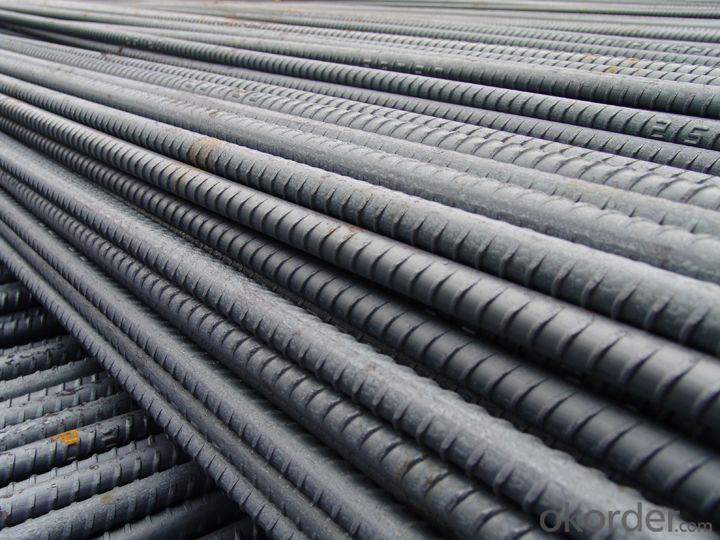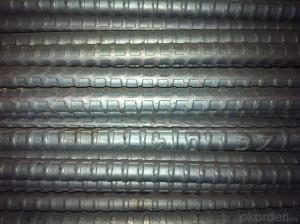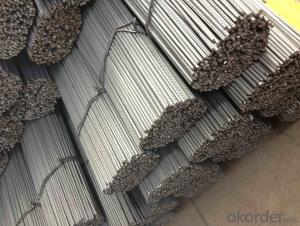Deformed Steel Bar 10mm 12mm Steel Rebar
- Loading Port:
- Shanghai
- Payment Terms:
- TT OR LC
- Min Order Qty:
- 50 m.t.
- Supply Capability:
- 10000 m.t./month
OKorder Service Pledge
OKorder Financial Service
You Might Also Like
Item specifice
Deformed Steel Bar 10mm 12mm Steel Rebar
Product Applications:
Deformed Steel Bar, 10mm 12mm Steel Rebar are ideal for structural applications and are widely used in the construction of buildings and bridges, and the manufacturing, petrochemical, and transportation industries.
Main Product Features:
· Premium quality
· Prompt delivery & seaworthy packing (30 days after receiving deposit)
· Can be recycled and reused
· Mill test certification
· Professional Service
· Competitive pricing
Product Specifications:
Manufacture: Hot rolled
Grade: HRB335,HRB400,HRB500
Certificates: ISO, SGS, BV, CIQ
Length: 6m – 12m, as per customer request
Packaging: Export packing, nude packing, bundled
Deformed Steel Bar | ||
Diameter (MM) | Cross Sectional Area (MM2) | Theorectical Weight (KG/M) |
6 | 28.27 | 0.222 |
8 | 50.27 | 0.395 |
10 | 78.54 | 0.617 |
12 | 113.1 | 0.888 |
14 | 153.9 | 1.21 |
16 | 201.1 | 1.58 |
18 | 254.5 | 2 |
20 | 314.2 | 2.47 |
22 | 380.1 | 2.98 |
25 | 490.9 | 3.85 |
28 | 615.8 | 4.83 |
32 | 804.2 | 6.31 |
36 | 1018 | 7.99 |
40 | 1257 | 9.87 |
Grade | Technical data of the original chemical composition (%) | |||||||
C | Mn | Si | S | P | V | |||
HRB500 | ≤0.25 | ≤1.60 | ≤0.80 | ≤0.045 | ≤0.045 | 0.04-0.12 | ||
Physics capability | ||||||||
Yield Strength(N/cm2) | Tensile Strength(N/cm2) | Elongation (%)
| ||||||
≥500 | ≥630 | ≥12 | ||||||

- Q:What is the difference between a peeled and a centerless ground steel round bar?
- A peeled steel round bar refers to a process where the outer surface of the bar is removed, typically by using a peeling machine, to achieve a smooth and precise surface finish. This process helps to remove any imperfections or scale on the surface of the bar, resulting in a clean and polished appearance. The peeled round bar also undergoes a sizing process to ensure its dimensional accuracy, making it suitable for various applications where a smooth surface finish and precise dimensions are important. On the other hand, a centerless ground steel round bar refers to a process where the bar is ground using a centerless grinding machine. This process involves feeding the bar through grinding wheels that rotate at different speeds, removing material from the bar's outer diameter to achieve the desired size and surface finish. Centerless grinding allows for tight tolerances and precise sizing, making it suitable for applications that require high precision and accuracy. In summary, the main difference between a peeled and a centerless ground steel round bar lies in the process used to achieve the desired surface finish and dimensional accuracy. While both processes result in a smooth and precise bar, peeling removes material from the outer surface, whereas centerless grinding removes material from the outer diameter. The choice between the two depends on the specific requirements of the application and the desired surface finish and dimensional accuracy.
- Q:Can steel round bars be used in the manufacturing of fasteners?
- Indeed, fasteners can be manufactured using steel round bars. Frequently, these bars serve as the fundamental materials for producing screws, bolts, and nuts. The circular form of the bars permits effortless molding and machining, enabling the fasteners to conform precisely to the desired specifications. Moreover, steel, being robust and durable, imparts the essential strength and resilience indispensable for fasteners to endure diverse applications and strains. Consequently, due to their mechanical properties and adaptability, steel round bars find widespread application in fastener production.
- Q:Can steel round bars be used in the manufacturing of appliances?
- Yes, steel round bars can be used in the manufacturing of appliances. Steel is a durable and versatile material that can be shaped into different forms, including round bars, which can be used for various purposes in appliance manufacturing such as structural support, handles, or components.
- Q:Are steel round bars suitable for use in the manufacturing of springs?
- Indeed, steel round bars prove to be a fitting choice when it comes to the fabrication of springs. The widespread use of steel round bars in spring production is owed to their exceptional sturdiness and longevity. The bar's circular form facilitates effortless bending and molding into diverse spring patterns. Moreover, steel boasts exceptional elasticity, rendering it an optimal material for springs that must absorb and retain mechanical energy. Furthermore, steel round bars exhibit commendable resistance to corrosion, an essential attribute for springs subjected to environmental elements. On the whole, steel round bars possess the essential qualities requisite for the creation of superior and dependable springs.
- Q:Can steel round bars be used in the textile industry?
- Steel round bars can indeed be used in the textile industry, albeit in limited applications. While textiles are primarily made from natural or synthetic fibers, steel round bars can be utilized in the machinery and equipment used in textile production. These bars are often used to construct frames, supports, and other structural components of textile machinery. For example, steel round bars can be used to build the frames of looms, which are used to weave fabrics. They can also be used in the construction of spinning machines, knitting machines, and other textile manufacturing equipment. Additionally, steel round bars can be used as a base or support for textile drying racks, storage systems, or conveyor systems. In these applications, the strength and durability of steel make it a suitable material for withstanding the demands of industrial textile production. However, it is important to note that steel round bars are not directly incorporated into the fabric or textile products themselves.
- Q:How can steel round bars be protected against rust?
- There are various ways to protect steel round bars from rust. One popular method involves applying a protective coating, like paint or a rust-resistant primer, which acts as a barrier between the steel and its surroundings, preventing moisture and oxygen from reaching the metal surface. Another effective approach is to galvanize the steel by immersing it in molten zinc. This creates a sacrificial barrier that shields the steel, even if it gets scratched or damaged. Maintaining the steel round bars is crucial in preventing rust. This involves keeping them clean and dry, as moisture is a major catalyst for rust formation. Regular inspections for rust or damage and prompt repairs are also important to prevent further corrosion. Storing the bars in a dry and well-ventilated area can help reduce the risk of rust. Elevating the bars off the ground or using moisture-absorbing materials, like silica gel packets, can provide additional protection against moisture buildup. Lastly, using corrosion inhibitors or rust-preventative oils can create a thin film on the surface that inhibits rust formation. By implementing these methods, steel round bars can be effectively shielded from rust, ensuring their durability and structural integrity.
- Q:Can steel round bars be used in the production of electrical equipment?
- Steel round bars are capable of being utilized in the production of electrical equipment. Steel possesses a multitude of properties that render it suitable for various applications, including electrical equipment. Components such as shafts, connectors, and structural supports within electrical equipment can be manufactured using steel round bars. The reliability of steel is derived from its strength and durability, enabling it to withstand the mechanical stresses and environmental conditions that electrical equipment may encounter. Moreover, steel offers favorable electrical conductivity and magnetic properties, crucial characteristics for specific electrical components. Nevertheless, it is important to acknowledge that steel round bars may necessitate additional processes like machining, heat treatment, or surface finishing in order to meet specific requirements for the production of electrical equipment.
- Q:Are steel round bars suitable for use in the mining industry?
- Yes, steel round bars are suitable for use in the mining industry. Steel round bars are known for their strength, durability, and resistance to wear and tear, making them ideal for various mining applications. They can be used in the construction of machinery, equipment, and infrastructure within mines, as well as for support structures such as mine shafts and tunnels. The high tensile strength of steel round bars allows them to withstand heavy loads and extreme conditions commonly encountered in mining operations.
- Q:How do I determine the strength and hardness of a steel round bar?
- To determine the strength and hardness of a steel round bar, you can perform various tests such as tensile testing, hardness testing, and impact testing. Tensile testing involves applying a pulling force to the steel bar until it breaks, measuring the maximum force it can withstand, and calculating its ultimate tensile strength. Hardness testing, on the other hand, measures the resistance of the steel to indentation or scratching, using methods like Brinell, Rockwell, or Vickers tests. Impact testing assesses the steel's ability to absorb energy by subjecting it to a sudden impact and measuring the resulting deformation. By conducting these tests, you can accurately determine the strength and hardness characteristics of a steel round bar.
- Q:What are the different heat treatment processes for steel round bars?
- There are several different heat treatment processes that can be used for steel round bars to enhance their mechanical properties and improve their overall performance. 1. Annealing: This process involves heating the steel round bars to a high temperature and then slowly cooling them, typically in a furnace. Annealing helps to relieve internal stresses, improve ductility, and refine the grain structure of the steel. 2. Normalizing: Normalizing is a heat treatment process that involves heating the steel round bars to a temperature above the critical range, followed by air cooling. This process helps to refine the grain structure, improve machinability, and enhance the mechanical properties of the steel. 3. Quenching and tempering: Quenching is a rapid cooling process that involves immersing the heated steel round bars into a quenching medium, such as oil or water, to rapidly cool them. This process results in the formation of a hard and brittle structure called martensite. To reduce the brittleness and improve the toughness of the steel, tempering is performed by reheating the quenched steel to a specific temperature and then cooling it. This process helps to improve the overall strength, hardness, and toughness of the steel. 4. Stress-relieving: Stress-relieving is a process that involves heating the steel round bars to a specific temperature below the critical range and holding it at that temperature for a certain period of time. This process helps to reduce residual stresses that may have developed during previous manufacturing processes, such as machining or welding. Stress-relieving improves the dimensional stability and reduces the risk of distortion or cracking in the steel round bars. 5. Induction hardening: Induction hardening is a specialized heat treatment process that involves selectively heating the surface of the steel round bars using high-frequency induction currents. This process quickly raises the temperature of the surface to a point where it can be hardened by quenching. Induction hardening is commonly used to increase the wear resistance and hardness of the surface while maintaining the toughness and ductility of the core of the steel round bars. These are some of the most common heat treatment processes used for steel round bars. The selection of the appropriate heat treatment process depends on the desired mechanical properties, intended application, and specific requirements of the steel round bars.
1. Manufacturer Overview |
|
|---|---|
| Location | |
| Year Established | |
| Annual Output Value | |
| Main Markets | |
| Company Certifications | |
2. Manufacturer Certificates |
|
|---|---|
| a) Certification Name | |
| Range | |
| Reference | |
| Validity Period | |
3. Manufacturer Capability |
|
|---|---|
| a)Trade Capacity | |
| Nearest Port | |
| Export Percentage | |
| No.of Employees in Trade Department | |
| Language Spoken: | |
| b)Factory Information | |
| Factory Size: | |
| No. of Production Lines | |
| Contract Manufacturing | |
| Product Price Range | |
Send your message to us
Deformed Steel Bar 10mm 12mm Steel Rebar
- Loading Port:
- Shanghai
- Payment Terms:
- TT OR LC
- Min Order Qty:
- 50 m.t.
- Supply Capability:
- 10000 m.t./month
OKorder Service Pledge
OKorder Financial Service
Similar products
New products
Hot products
Related keywords






























